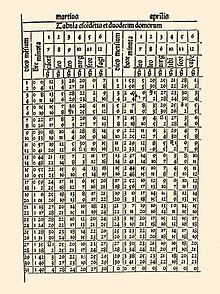Abraham Zacuto

Abraham Zacut or Abraham Ben Zacuto (in Hebrew: אברהם זכות; in Portuguese Abraão ben Samuel Zacut) (Salamanca, 1452 - Damascus, around 1515) was a Judeo-Spanish mathematician, astronomer and historian.
Biography
Abraham ben Samuel ben Abraham Zacuto was born in 1452 in Salamanca, coming from a family of French origin that had emigrated to the kingdom of Castile after the expulsion of the Jews from France in 1306. He grew up in the same city, being educated by his father, Rabbi Samuel Zacuto, and by Rabbi Isaac Aboab. He studied the Torah and Talmud, as well as Kabbalah. His training is not known, although it is likely that he studied at the University of Salamanca although, contrary to what has been stated, he did not become a professor there, since his name does not appear in any cloistered book and Canon Law prohibited Jews the exercise of teaching in ecclesiastical universities.
He was a friend and protected by the rector and bishop of Salamanca, Gonzalo de Vivero, who urged him to compose his first and most important work, the Ha-ḥibbur ha-gadol or The Great Composition After the death of the bishop, Zacuto was forced to find a new protector and moved in 1485 from Salamanca to the town of Gata, in Cáceres, where he entered the service of Juan de Zúñiga y Pimentel, last master of the Order of Alcántara, also protector of Antonio de Nebrija. He wrote several works by order of his protector, the main one being the Treatise on the Influences of Heaven . Due to the absence of a large library, Zacuto had to write everything practically from memory during his stay in Gata.
In 1492, after the expulsion of the Jews from Spain, he sought refuge in Portugal, where he was appointed Historian and Royal Astronomer by King John II, a position he held during the reign of Manuel I. Some sources give him a clear influence in the voyages of Vasco da Gama, as is the case of the Portuguese chronicler Gaspar Correia in his work Lendas da Índia, although its importance has been discussed in recent studies, which reject that Zacuto had knowledge about navigation or instruments like the astrolabe.
Around 1497 Zacuto left Portugal to escape forced conversions and settled in Tunisia after a trip during which he was imprisoned twice. There he completed some of his works and dedicated himself to teaching, but, faced with the possibility that the Spanish would conquer Tunisia, Zacuto left the country heading to Turkey. He ended up dying in Damascus (or Jerusalem) in 1515 or 1522.
Works
- Hosafot le-sefer ha-日本語Aruk: It's a lexicographic work. Consists of a treaty with additions and amendments Ha-longArukA talmudic dictionary composed of Natan ben Yehiel. It was written after 1506 in Tunisia.
- Sefer Yuḥasin: ♪ Book of Genealogy, it seems that it was composed in Portugal and completed in Tunisia (date limit of 1510). It exposes Jewish history from the beginning of the world to the centuryXVI, reporting on the transmission of traditional or oral law from Moses until that time. This work is part of the current of Jewish historiographic works, of which the most outstanding is The rod of Judahof the Ben Verga brothers, although it would not be until the appearance of Rossi's Azaria when the Jewish historical criticism began. Due to the large number of editions Sefer Yuḥasin (was reprinted in Krakow in 1581, in Amsterdam in 1717 and in Königsberg in 1857), it is evident that it was an admired work. In it you can notice a certain intolerance towards other races and religions not seen before, probably because it was a late work, after the expulsion of Castile and Portugal.
- ha-Hibbur ha-gadol (originally in Hebrew, in Spanish, The Great Composition). It consists of a series of astronomical tables with a radix date in 1473, which provide the true daily positions of the sun, moon and five of the planets, together with the explanation of their handling in 19 chapters plus a brief introduction. Its measures are calculated for the meridian of Salamanca. It was written in Hebrew from 1473, ending it in 1478, and translated into Spanish by Juan de Salaya in 1481
- Almanach perpetuum is the main astronomical work of Abraham Zaccuto. It ended when Zacut was already in Portugal, where it was edited in 1496. He had several later editions. Part of the tables coindiciden with his previous work ha-Hibbur ha-gadol.
- Treaty of the Influences of Heaven: Eis a work of medical astrology written in 1485 by order of Juan de Zúñiga and Pimentel. It is divided into three parts in which Zacuto exposes the relevance of astrology in the study of corporeal diseases and the influence exerted by the heavens on such diseases, in order to instruct the doctors of the master in such knowledge.
- Judgment of the eclipses, about the Sun and Moon: Written also by order of Juan de Zúñiga and Pimentel, it consists of another work of astrological theme in which he treated the meaning and influence that the eclipses of the sun and the moon possess on our planet, as well as their influence on bodily diseases.
- Mišpaṭei has-purchase-purchase. Proceedings of astrologer, work concerning the years 1518-1524.
- jayim: Life treasure.
Tributes
- The lunar crater Zagut bears this name in his memory.

- In Salamanca, the Science Campus library bears the name of Abraham Zacut Library. In addition, in front of it there is a building built on the plot that occupied the synagogue before the expulsion of the Jews, and in it is located the section of mathematics of the Faculty of Sciences.
Contenido relacionado
Ocean tide
Pharmacist
Chikusichloa